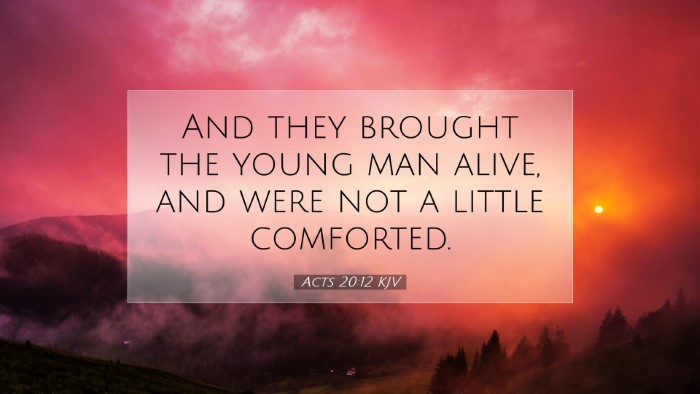Commentary on Acts 20:12
Acts 20:12 states: "And they brought the young man alive, and were not a little comforted."
Contextual Overview
This verse occurs within a significant narrative where the Apostle Paul is concluding his ministry in Ephesus and journeying toward Jerusalem. The incident involves Eutychus, a young man who fell asleep during Paul's lengthy discourse and fell from the third story of a building. His death and subsequent resurrection through Paul highlight the miraculous power of God working through the Apostle, but it also encapsulates the dynamic tension between human frailty and divine intervention.
Insights from Public Domain Commentaries
Matthew Henry's Commentary
Matthew Henry emphasizes the nature of the event as an illustration of God's mercy and the Apostle's authority.
-
On Eutychus' Fall:
Henry suggests that Eutychus' fall represents the dangers of spiritual complacency and the perils of neglecting the attentiveness required during the preaching of the Word.
-
On the Miracle:
The resurrection of Eutychus serves to solidify the faith of those present, demonstrating that Paul is a messenger of Christ with the authority to perform miracles. It serves as a moment of profound encouragement for the early church.
-
On Comfort:
The phrase "were not a little comforted" highlights the profound joy derived from witnessing God's miraculous power. Henry notes this emphasizes the community’s response, which extends beyond mere emotional relief to a deepening of their faith.
Albert Barnes' Commentary
Albert Barnes elaborates on the theological implications of Eutychus' resurrection, likening it to Christ's resurrection and illustrating early Christian beliefs in life after death.
-
On the Nature of Miracles:
Barnes posits that miracles like this are meant to confirm the message of the Gospel, showing that the Creator has power over life and death. He advocates understanding them as signs of God's providence.
-
The Response of the Believers:
The comfort experienced by the gathered congregation is pointed out as a significant aspect. It indicates the communal nature of faith and the shared joy experienced through collective recognition of divine acts.
Adam Clarke's Commentary
Adam Clarke's exposition on this passage discusses the implications of familial and communal relationships within the church.
-
On the Role of Eutychus:
Clarke observes that Eutychus is depicted in a relatable manner, falling asleep under the weight of long teaching, which serves as a reminder for contemporary believers about the need for vigilance and engagement during worship.
-
On Significance of the Miracle:
He alongside other commentators underscores that the act of bringing Eutychus back to life did not merely serve the one individual but revitalized the entire gathering, reinforcing the community's faith and fostering a sense of hope.
-
Theological Reflection:
Clarke further discusses the importance of the miraculous in affirming the hope of resurrection. He asserts that the comfort that arose from witnessing such miracles is emblematic of the greater hope Christians have in Jesus Christ.
Theological Implications
The incident encapsulated in Acts 20:12 serves as a profound illustration of several theological themes:
-
Human Vulnerability:
Eutychus' sleep and fall remind the church of the frailty of human nature. It casts light on the necessity for vigilance in spiritual matters while indicating an understanding and compassion within the church for human weakness.
-
Divine Power:
The miraculous nature of Eutychus' revival stands as a testimony to the omnipotent nature of God at work through His apostles, validating their ministry and offering assurance to early Christians of God's continual presence and care.
-
Community and Relationship:
The comfort experienced by the congregation reflects the communal aspect of faith. Miracles serve not only to strengthen individual believers but also to bind the community together in mutual encouragement and shared belief.
-
Hope of Resurrection:
This event prefigures the hope believers have in the resurrection through Christ. The early church’s experience resonates with the broader narrative of redemption, culminating in eternal life.
Conclusion
The story encapsulated in Acts 20:12 offers rich insights into the nature of ministry and the power of divine intervention. It reassures believers of God's intimate concern for His people. For pastors and scholars alike, this passage serves to reinforce the significance of attentive worship, the communal aspect of faith, and the transformative power of the Gospel, urging a response of faith rooted in the knowledge of God’s continual work.


